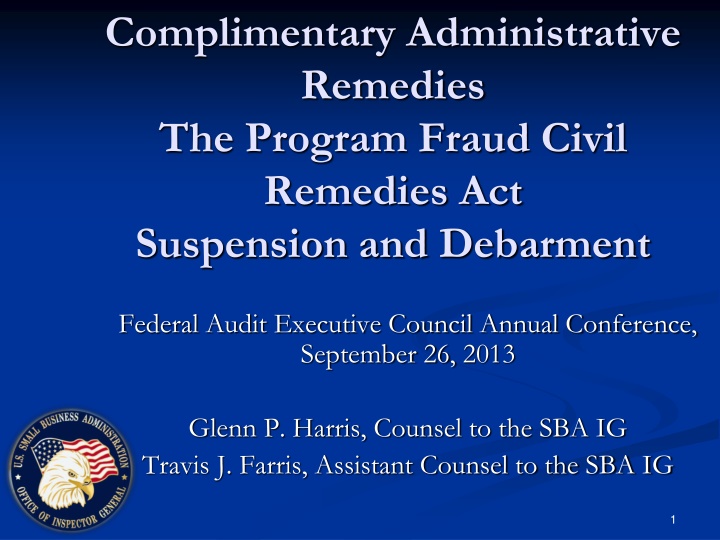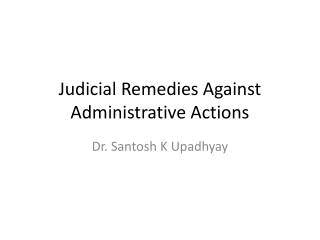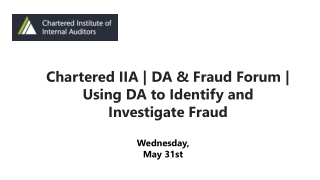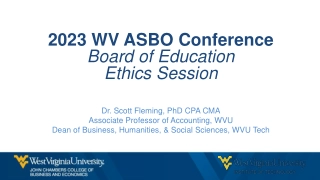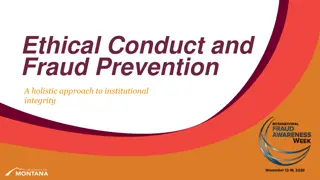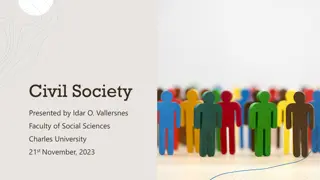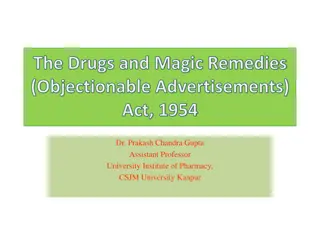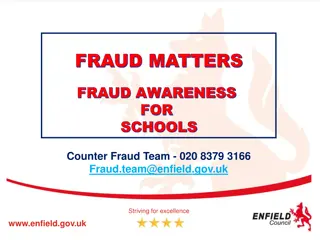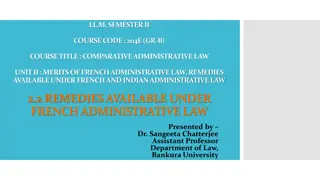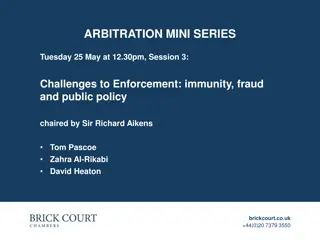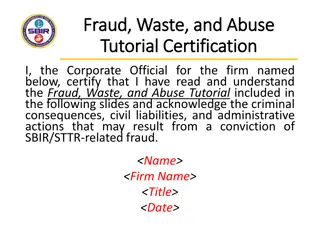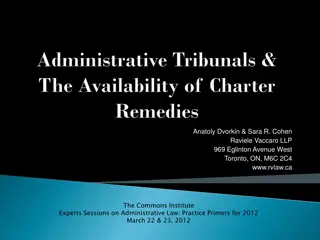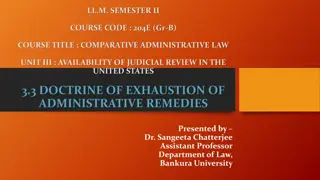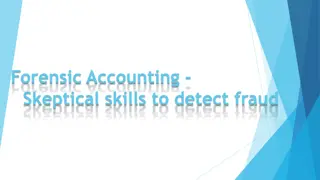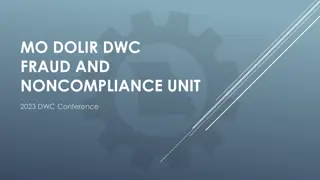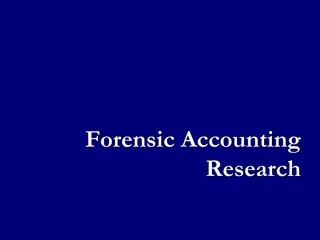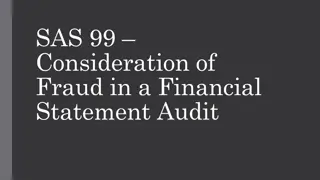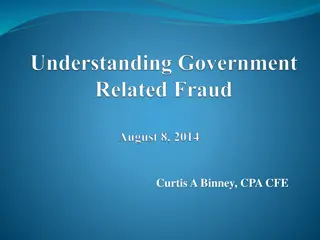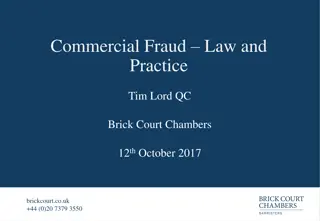Complimentary Administrative Remedies - The Program Fraud Civil Remedies Act
This content focuses on the Program Fraud Civil Remedies Act (PFCRA), Suspension and Debarment, recent CIGIE efforts, and incorporating these remedies into audit planning. Learn about the history, statutory elements, and key knowledge related to PFCRA and its intent to address lower dollar value cases. Gain insight into the liability, penalties, assessments, and limitations under PFCRA.
Download Presentation

Please find below an Image/Link to download the presentation.
The content on the website is provided AS IS for your information and personal use only. It may not be sold, licensed, or shared on other websites without obtaining consent from the author.If you encounter any issues during the download, it is possible that the publisher has removed the file from their server.
You are allowed to download the files provided on this website for personal or commercial use, subject to the condition that they are used lawfully. All files are the property of their respective owners.
The content on the website is provided AS IS for your information and personal use only. It may not be sold, licensed, or shared on other websites without obtaining consent from the author.
E N D
Presentation Transcript
Complimentary Administrative Remedies The Program Fraud Civil Remedies Act Suspension and Debarment Federal Audit Executive Council Annual Conference, September 26, 2013 Glenn P. Harris, Counsel to the SBA IG Travis J. Farris, Assistant Counsel to the SBA IG 1
Goals of this Training Familiarize Participants with the Program Fraud Civil Remedies Act (PFCRA), Suspension and Debarment Discuss Recent CIGIE Efforts Provide structure for incorporating these remedies into audit planning 2
What We Will Cover The Program Fraud Civil Remedies Act Suspension & Debarment CIGIE Activity Supporting These Remedies 3
The Program Fraud Civil Remedies Act of 1986 PFCRA 31 U.S.C. 3801 et seq Or, the Baby False Claims Act. 4
What You Need to Know PFCRA is an administrative remedy designed to reach frauds not selected for False Claims Act cases. Agencies litigate PFCRA cases in front of Administrative Law Judges (ALJs). PFCRA provides liability for both false claims and false statements. 5
History and Intent of PFCRA PFCRA was enacted in 1986 to deal with lower dollar value cases DOJ was not litigating. PFCRA ensures Federal agencies have redress for false statements and smaller false claims not selected for enforcement litigation by the Department of Justice. 6
Statutory Elements Impose civil penalties and assessments for: Persons who Make, Submit or Present or, Cause to Be Made, Submitted or Presented False Fictitious or Fraudulent Claims or, Statements They Knew or Had Reason to Know were False To Federal Authorities or their agents. 6 Year Statute of Limitations (stops running when ALJ sends the scheduling order). PFCRA actions may be prosecuted in concert with, or in lieu of, debarment. 7
Key Slide Knowledge Unlike criminal cases, the Act provides that no proof of specific intent to defraud is required. Liability can be based on: Actual knowledge of the information Acting in deliberate ignorance of the truth or falsity of the information Acting in reckless disregard of the truth or falsity of the matter. SBA Office of Inspector General 8
Knowledge - continued What is Reckless Disregard ? Legislative history -- persons making claims for payment to the Government must make at least some inquiry, to be reasonably certain they are entitled to be paid. Inquiry can be limited, but should be reasonable and prudent under the circumstances. Congress was addressing the ostrich type of situation where an individual has buried his head in the sand and failed to make simple inquiries. There must be at least a minimal review to avoid a finding of reckless disregard. SBA Office of Inspector General 9
Knowledge - continued What is Reckless Disregard ? Mere negligence probably not enough. Reckless disregard may be considered the equivalent of aggravated form of gross negligence, or gross negligence-plus. [False Claims Act law is often applied to interpret the PFCRA.] A defendant's good faith interpretation of a regulation does not give rise to liability. SBA Office of Inspector General 10
Knowledge - continued A key to showing that there was no reckless disregard is the level of due diligence that was exercised: Quality Controls in place Review of Underlying Documents/Internal Procedures Employment Practices for Hiring, Assigning, Training and Retaining Personnel involved in claim creation or submission Keep in mind This does not require a no stone unturned review. A limited review that is reasonable and prudent under the circumstances is needed. SBA Office of Inspector General 11
PFCRA Cases are Based Upon Claims or Statements Claims Statements Request or other submission Made to an Agency or a third party handling Federal funds For Property or services. Could also be a reduction in amount owed to the Federal Government. A writing Made with respect to a claim or program eligibility False because it asserts or omits a material fact 12
Remedies for False Claims Civil Penalty of up to $5,000 for each false claim (unless adjusted) Assessment of double the amount of paid claim Recovery limited to claims of $150,000 or less 13
Remedies for False Statements Civil Penalty of $5,000 for each false statement (unless adjusted) 14
Vicarious Liability When is an employer liable for the false claims submitted by an employee? Courts have employed several tests: Majority If the employee was acting within the scope of his or her authority, the employer is vicariously liable. Minority Employee s actions must also have benefitted the employer. Minority Alternate approach did employer have constructive knowledge (i.e., should the employer have known). SBA Office of Inspector General 15
Procedure There must be an investigative report referred by the Office of Inspector General. OIG report is submitted to the Reviewing Official (usually the General Counsel or designee). Department of Justice must approve all PFCRA actions. Cases are adjudicated in front of Administrative Law Judges. 16
OIG Report Presents findings and conclusions of investigation to Reviewing Official Should contain all evidence necessary to assess the proposed action Should contain contact information for an investigating agent 17
Reviewing Official Assesses whether the evidence and Report of Investigation support a finding of liability under the PFCRA If appropriate, drafts a request for authorization from DOJ so the Agency might proceed with a PFCRA Determines whether there is a reasonable prospect of collecting an appropriate amount of penalties and assessments 18
Suspension and Debarment 19
What You Need to Know Suspension and Debarment is The Government s Way of Making a Business Decision. Suspension and Debarment may not be used for punishment. These remedies are prospective only. 20
Two Federal Suspension and Debarment Systems Exist: Nonprocurement and Procurement 21
Nonprocurement and Procurement Suspension and Debarment Rules: Essentially the same effect no participation in procurement or nonprocurement transactions irrespective of which system caused the suspension or debarment. Similar terminology and procedure. 22
Key Differences Nonprocurement (NCR) No automatic exclusion for proposed debarment. Focus is on Grants, guarantees, insurance etc. Found in Title 2 of the Code of Federal Regulations, Part 180, and in agency pieces. No debarment for delinquent tax debt (yet). Procurement (FAR) Automatic exclusion upon proposed debarment. Focus is on goods and services the Government purchases. Found in Title 48 of the C.F.R., Subpart 9.4, and in some agency pieces. May debar for delinquent tax debt in excess of $3,000. 23
Suspension Used when you have adequate evidence of a violation that may merit debarment and immediate action is necessary to protect the Government s interest. Lasts for up to one year (with a possible six month extension) or until legal proceedings, such as a criminal case or debarment action, have concluded. Effective Immediately. 24
Debarment Used when cause for debarment exists by a preponderance of the evidence and the debarment is in the public interest. Debarment is intended to protect the Government, not punish the respondent. 25
Cause for Debarment Four General Categories: Conviction of, or civil judgment for, certain offenses; Violation of the terms of a public agreement so serious as to affect the integrity of an agency program; Certain eligibility issues; and, Anything else so serious or compelling it affects the respondent s present responsibility. 26
Conviction or Civil Judgment Fraud or criminal offense in connection with public or private agreement Antitrust violations Financial crimes (e.g., embezzlement, theft forgery, bribery, falsification of records, destruction of records, tax evasion false claims or obstruction of justice) Any other offense indicating a lack of business integrity (e.g. criminal contempt) 27
Violation of Terms of a Public Agreement Affecting Integrity Willful failure to perform in accordance with terms of one or more agreements History of performance failure in public agreements Willful violation of statute, regulation or other requirement pertaining to a public agreement 28
Eligibility Issues Knowingly doing business with an ineligible person Substantial Federal Debt either uncontested or with appeals exhausted (tax debt actionable under the FAR, but not the NCR this should change soon) Violation of a Voluntary Exclusion Agreement Drug-Free Workplace Act of 1988 Violations 29
Other Issues Affecting Present Responsibility Failure to cooperate with the IG s office, without an Obstruction of Justice conviction Failure to file tax returns without a criminal conviction Misrepresentations 30
Suspension and/or debarment protects the Government more than program termination alone. Only suspension and/or debarment stop future violations in other programs. 31
Effect of Suspension or Debarment Prospective Remedy Only. May Not Be a Participant in a Covered Transaction. May Not Be a Principal in a Covered Transaction. May Not Be an Agent or Representative in a Covered Transaction. Reciprocity Between Procurement and Nonprocurement Systems. 32
Participants MAY, however: Continue covered transactions in existence at the time the Agency excluded the participant. Continue to use the services of an excluded principal when the principal was on a transaction in existence at the time the principal was excluded. Bid on a contract if award will happen after the exclusion expires. 33
Unless an Exception has been granted, Agency Officials MAY NOT: Enter into a covered transaction with a suspended or debarred party Renew or extend covered transactions with a suspended or debarred party. (No-cost time extensions are acceptable) Enter into a covered transaction with a participant using a suspended or debarred principal Approve the use of an excluded party in a covered transaction 34
Issue Spotting Be aware of systemic implications Individual abusing Federal programs rarely limit themselves to one transaction. Failure of the Government to respond or to meaningfully address fraud may embolden contractors Your knowledge of how programs work is crucial to program integrity attorneys. Materiality Likelihood of Error Reasonability 36
Program Fraud Civil Remedies Act Working Group Commissioned in November 2012 First Met in January 2013 Projects include: Practitioner s Guide Contemplated Usage Survey (to compliment GAO survey work) Legislative Recommendations 38
Suspension and Debarment Working Group Tasked with raising awareness of suspension and debarment Several Annual Conferences Surveyed use of Suspension and Debarment in 2010 and 2012 Don t Let the Toolbox Rust Paper: http://www.ignet.gov/randp/sandwgrpt092011.pdf 39
CIGIE Training Institute Audit, Inspection and Evaluation Academy Course on Suspension and Debarment emphasizing team approach between Auditors, Inspectors, Evaluators and Counsel. 40
Incorporating PFCRA, Suspension and Debarment into IG Processes and Procedures 41
PFCRA Convert Reports of Investigation into PFCRA IG Report Declinations Convictions Audit Recommendations may be recast as PFCRA IG Reports Audits can mention assessment of contemporaneous IG PFCRA referral. 42
Suspension and Debarment Assess internal controls and risks Actions indicating a lack of present responsibility should go to the Suspending and Debarring Official Work on referral structure Audit Recommendations Declined Cases Judicial actions such as warrants, indictments, information and convictions. 43
Questions? 44
